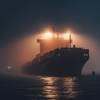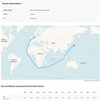Captain of Korean Flagged Ship Sentenced
Hae Wan Yang, 54, of South Korea, was sentenced on Dec. 30 in U.S. District Court in Tacoma to two months of home confinement in the United States and two years of supervised release for violating the Act to Prevent Pollution from Ships by knowingly failing to maintain an accurate Garbage Record Book.
Yang was the Captain of the M/V Pan Voyager a ship belonging to STX Pan Ocean Co., Ltd., a South Korean Shipping Company. The inaccuracy was a failure to record a dumping incident during which approximately six 55-gallon drums, thirty plastic lined rice sacks, and approximately two hundred garbage bags containing oil contaminated grain were thrown into the ocean during a voyage from Korea to Longview, Washington. In October 2008, the shipping company pleaded guilty and paid a $500,000 fine, and made a $250,000 community service payment to the National Fish and Wildlife Foundation for use in projects to restore Puget Sound. The company also agreed to a stringent environmental compliance plan with outside auditing.
Yang has been detained in the United States since August. Judge Benjamin Settle said he would have sent Yang to prison, but for a life threatening health condition. The judge opted for detention in a U.S. residence so that he could seek medical care, before he is allowed to return to his home country.
According to the facts stated in the plea agreement, the dumping occurred from the M/V Pan Voyager, a South Korean flagged 17,000 ton ocean going bulk carrier. In July 2008, the ship was in South Korea unloading grain when crew members discovered a hole in one of the vents leading to a fuel oil tank. A substantial amount of grain spilled into the hole, entered the tank, and contaminated the fuel oil. Captain Yang and other senior officers on the vessel subsequently ordered lower level crew members into the tank to remove the contaminated grain. Crew members used buckets and dust pans to remove the grain/fuel oil waste and dump it into the drums, plastic lined rice sacks, and large plastic garbage bags.
On July 24, 2008, the crew used one of the vessel’s cargo cranes to lift the drums, sacks and bags onto the main deck. Working under the cover of darkness, using only flashlights because Captain Yang refused to turn on the deck lights, crew members dumped the waste overboard. The plastic bags and rice-sacks were punctured in hopes that they would sink and further reduce the risk of detection. Captain Yang was on the bridge and wing of the ship during the dumping and observed the activity. Coast Guard inspectors discovered that a section of the deck railing had been cut away and then welded back into place to facilitate the illegal dumping.
When the ship arrived in Longview, two whistle blowers provided information related to the dumping. Investigators with the United States Coast Guard and the Environmental Protection Agency boarded the vessel and discovered evidence corroborating the whistle blowers information. They observed large streaks of oil alongside the outer hull of the ship where the waste was tossed into the sea. The Garbage Record Book made no reference to the dumping. The book was presented to the Coast Guard by the senior officers, knowing that it was false. While investigators were on the ship Captain Yang encouraged other crew members to lie about the amount of waste dumped at sea.
In asking for the prison time for Yang, Assistant United States Attorney Jim Oesterle argued that this type of dumping has reached epidemic proportions, and is doing significant environmental damage. The plastic materials Yang ordered dumped at sea will persist in the marine environment for 450 years. In his sentencing memo Mr. Oesterle urged the court to impose prison time to send a message that dumping waste at sea will not be tolerated. “As Captain of the vessel, Defendant Yang had a heightened duty to ensure that all vessel operations were conducted in strict compliance with international laws. He failed in that duty. He falsified the Record Book in a failed effort to conceal the dumping he directed; dumping that he ordered be done under the cover of darkness on the high seas to avoid detection,” Oesterle wrote in his sentencing memo.
“Captain Hae Wan Yang made false statements to conceal the disposal of hundreds of plastic bags and barrels of contaminated grain into international waters,” stated Acting Special Agent in Charge Tyler Amon with EPA’s Criminal Investigation Division in Seattle. “Captains and their crew must obey the law or risk criminal prosecution.”
The case was investigated by the U.S. Coast Guard and the U.S. Environmental Protection Agency. The case is being prosecuted by Assistant United States Attorney Jim Oesterle, who leads the U.S. Attorney’s Office Environmental Crimes Working Group and Special Assistant United States Attorney LCDR Marc Zlomek, with the U.S. Coast Guard.










